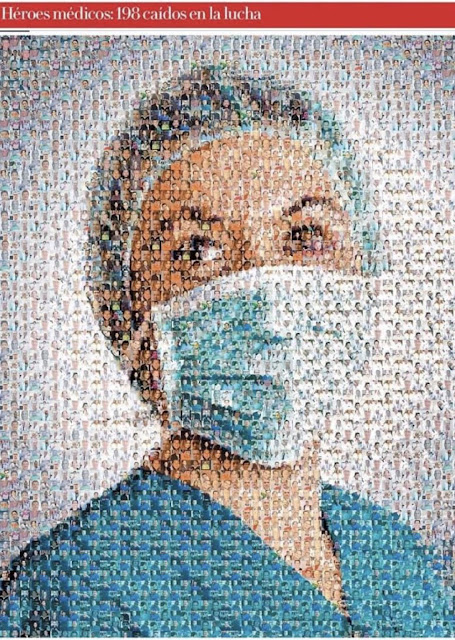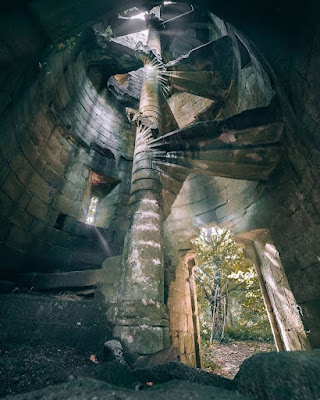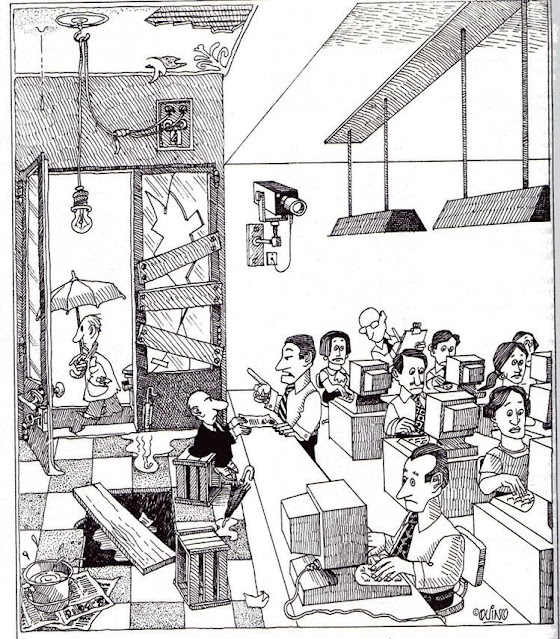En el mundo sanitario se nos quebró la narrativa. Han sido muchos años abusando de palabras, documentos, reuniones y powerpoint. Es cierto que políticos, profesionales y ciudadanos hicimos valer nuestros derechos, gritamos y defendimos nuestra propia verdad en un diálogo de besugos en los que faltó muchísima escucha. También que no quisimos aceptar un naufragio evidente pese a las evidencias.
Tantos golpes recibió la sanidad que la misión, visión y los valores de la organización se rompieron, llevándose por delante a muchos sanitarios que acabaron quemados y otros muchos pacientes que murieron por covid o patologías no suficientemente atendidas.
Pese a todo el reto está pendiente: convertir una sanidad sólida, de vieja escuela y gran inercia, en una líquida, flexible y adaptada a los tiempos que corren.
El problema es que el mercado quiere a los pacientes como meros consumidores de recursos sanitarios y a los sanitarios como industriosos proveedores, lo que convierte a los sistemas sanitarios en cadenas de montaje donde al final unos y otros somos simples peones movidos cada vez más velozmente. Sin embargo el sistema público no puede aguantar una demanda de servicios que tiende al infinito con unos recursos cada vez más menguados. Recursos humanos que se deshumanizan por la sobrecarga creciente fundiéndose lentamente como un bloque de hielo que alguien sacó del frigorífico.
En esas estábamos cuando la pandemia hizo saltar por los aires los goznes sanitarios al someter a una presión imposible unos recursos ya bastante dañados.
Y ahora ¿cómo reconstruimos la narrativa sanitaria?
La desesperanza y las heridas causadas en los profesionales no facilitarán que estos lideren el proceso. Los políticos seguirán a los suyo con vistas al corto plazo de las siguientes elecciones. Y con la ciudadanía será difícil contar, mareada como está con tanto frente abierto y engañada por desaprensivos que anuncian zanahorias cuando lo que de verdad ofrecen son los palos de la desfinanciación. Unas pocas manifestaciones de protesta no moverán el agua del molino.
Serán necesarias muchas voces, mucha escucha y mucha entereza. Precisaremos de silencio para poder reflexionar y aportar creatividad e ideas.
Por mi parte, como médico de familia (descalzo), me gustaría aportar que el sistema debería focalizarse en lo más importante que a mi juicio es la relación sanitario-paciente. Algo delicado y sutil pero con la suficiente fuerza como para servir de punto de apoyo de cualquier palanca estructural y tecnológica que gusten usar.
Y a la hora de aportar valor tener claro que el paciente no puede ser convertido en mero consumidor pasivo de recursos. La salud no es un producto, por mucho que al mercado le interese. También pediría que los profesionales no fuéramos meros productores de servicios sanitarios, lo que nos convierte en piezas de cadenas de montaje infinitas que deshumanizan tanto al clínico como a los que pasan por sus manos. Es fundamental que ayudemos a aportar sentido a la narrativa del paciente, para que este pueda integrar su tiempo de enfermar, su catástrofe vital y sus emociones en su autobiografía sin tener que delegarla en productos y servicios sanitarios que no tendrán jamás la potestad de hacerlo en su lugar.
Este rescate de la dimensión narrativa de la salud y la enfermedad del paciente por un lado y del rol facilitador del sanitario por otro puede ser la semilla desde la que pueda generarse una nueva narrativa institucional que en este momento está en ruinas.
No es todo una cuestión de recursos. Estos son importantes, no lo voy a negar, pero no nos podemos quedar solo ahí. Hay que mirar más lejos y recordar que las palabras y las narrativas tienen mucho poder. Si fueron capaces de levantar pirámides en medio del desierto o de llevar al hombre a la luna lo serán también ahora si decidimos usarlas para renovar nuestras zozobrantes instituciones.
The search for a new health narrative.
In the National Health system, the narrative has broken down. We have spent many years abusing words, documents, meetings and powerpoints. It is true that politicians, professionals and citizens asserted our rights, we shouted and defended our own truth in a separe dialogue in which there was a great lack of listening. It is also true that we did not want to accept an obvious shipwreck despite the evidence.
So many blows were dealt to healthcare that the mission, vision and values of the organisation were shattered, taking with them many health workers who ended up burned and many other patients who died from covid or pathologies that were not sufficiently attended to.
Despite all this, the challenge remains: to convert a solid, old-school, inertial healthcare system into one that is liquid, flexible and adapted to the times.
The problem is that the market wants patients to be mere consumers of healthcare resources and healthcare providers to be industrious suppliers, which turns healthcare systems into assembly lines where in the end we are all just pawns moved at ever increasing speed. However, the public system cannot withstand a demand for services that tends to infinity with ever-diminishing resources. Human resources that are dehumanised by the growing overload, slowly melting like a block of ice that someone took out of the fridge.
That's where we were when the pandemic blew the health hinges off the hinges by putting impossible pressure on already stretched resources.
And now how do we reconstruct the health narrative?
The despair and the wounds inflicted on professionals will not make it easy for them to lead the process. Politicians will continue to do their own thing with a view to the short term of the next elections. And it will be difficult to count on the public, dizzy as they are with so many open fronts and deceived by unscrupulous politicians who announce candy when what they are really offering are the sticks of defunding. A few protest demonstrations will not move the windmill.
It will take many voices, a lot of listening and a lot of fortitude. We will need silence in order to be able to reflect and contribute creativity and ideas.
For my part, as a family doctor (barefoot), I would like to say that the system should focus on the most important thing, which in my opinion is the patient-healthcare relationship. Something delicate and subtle but with enough strength to serve as a fulcrum for any structural and technological lever that they want to use.
And when it comes to adding value, it must be clear that the patient cannot be turned into a mere passive consumer of resources. Health is not a product, however much the market may be interested in it. I would also ask that we professionals should not be mere producers of health services, which turns us into parts of endless assembly lines that dehumanise both the clinician and those who pass through their hands. It is essential that we help to give meaning to the patient's narrative, so that they can integrate their time of illness, their life catastrophe and their emotions into their autobiography without having to delegate it to health products and services that will never have the power to do so in their place.
This rescue of the narrative dimension of the patient's health and illness on the one hand, and of the facilitating role of the health worker on the other, may be the seed from which a new institutional narrative can be generated, which is currently in ruins.
It is not all a question of resources. These are important, I will not deny it, but we cannot stop there. We have to look further afield and remember that words and narratives have a lot of power. If they were able to build pyramids in the middle of the desert or put man on the moon, they will be able to do so now if we decide to use them to renew our crumbling institutions.
寻找一种新的健康叙事。
机器翻译,抱歉有错误。
在医疗保健领域,我们的叙述已经崩溃了。滥用文字、文件、会议和Powerpoint已经很多年了。诚然,政治家、专业人士和公民主张我们的权利,我们在缺乏大量倾听的对话中喊出并捍卫自己的真理。还有,尽管有证据,我们也不想接受一个明显的沉船事件。
卫生部门受到如此多的打击,以至于该组织的使命、愿景和价值观被打破,带走了许多最终被烧死的卫生工作者和许多其他死于ovid或病症而没有得到充分照顾的病人。
尽管所有的挑战都悬而未决:将坚实的健康、老式的和巨大的惯性转换为流动的、灵活的和适应时代的。
问题是,市场希望病人仅仅是健康资源的消费者,而健康则是勤劳的供应商,这使得卫生系统处于流水线上,最终我们只是被越搬越快的小卒。然而,在资源日益减少的情况下,公共系统无法承受趋于无限大的服务需求。越来越多的超载使人力资源失去人性,像一块被人从冰箱里取出的冰块一样慢慢融化。
这就是当大流行病通过给已经受损的资源施加不可能的压力而炸毁健康铰链时我们的处境。
而现在,我们该如何重构健康叙事?
绝望和对专业人士造成的创伤不会使他们更容易领导这一进程。政治家们将继续做他们自己的事情,着眼于下一次选举的短期。而且很难指望公民权,因为它被这么多公开的幌子弄得晕头转向,并被那些宣布胡萝卜的无良人士欺骗,而他们真正提供的是解约的大棒。几次抗议示威并不能将水从工厂移走。
这将需要许多声音,大量的倾听和大量的毅力。我们将需要沉默,以便能够反思并贡献出创造力和想法。
就我而言,作为一名家庭医生(赤脚),我想做出贡献,该系统应该关注最重要的事情,在我看来,这就是健康与病人的关系。一些精致而微妙的东西,但有足够的力量作为他们想要使用的任何结构和技术杠杆的支点。
而当涉及到增加价值时,必须明确的是,不能把病人变成一个单纯的被动的资源消费者。健康不是一种产品,无论市场对它多么感兴趣。我还想问,专业人员不应仅仅是健康服务的生产者,这将我们变成无尽的流水线的一部分,使临床医生和那些经过他们手的人都失去了人性。至关重要的是,我们要帮助赋予病人的叙述以意义,使他们能够将他们的患病时间、生活灾难和情感融入他们的自传中,而不必将其委托给那些永远没有权力代替他们的健康产品和服务。
这种对病人的健康和疾病的叙事层面的拯救,以及对卫生工作者的促进作用的拯救,可能是一颗种子,从中可以产生一种新的机构叙事,而目前这种叙事正处于废墟之中。
这不全是一个资源问题。这些都很重要,我不否认,但我们不能止步于此。我们必须看得更远,并记住文字和叙述有很大的力量。如果他们能够在沙漠中建造金字塔或将人类带入月球,如果我们决定利用他们来更新我们摇摇欲坠的机构,他们现在也能做到。























